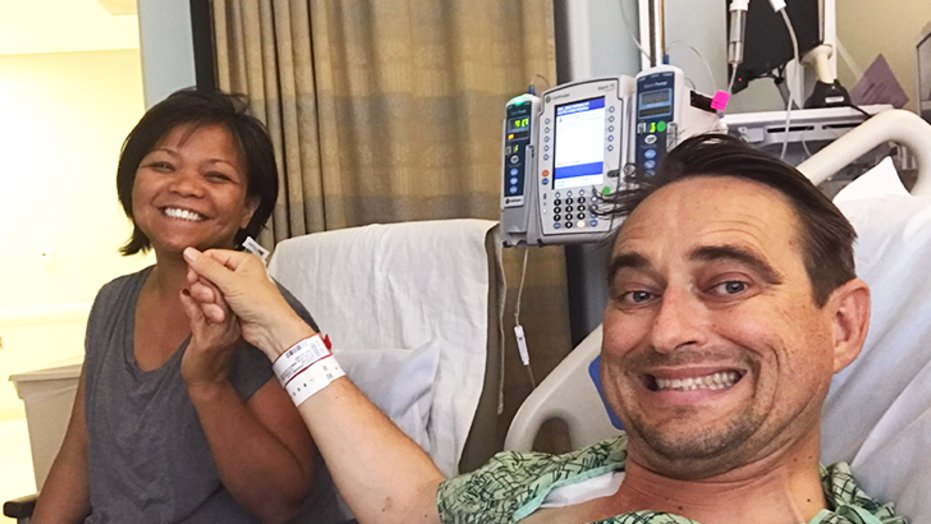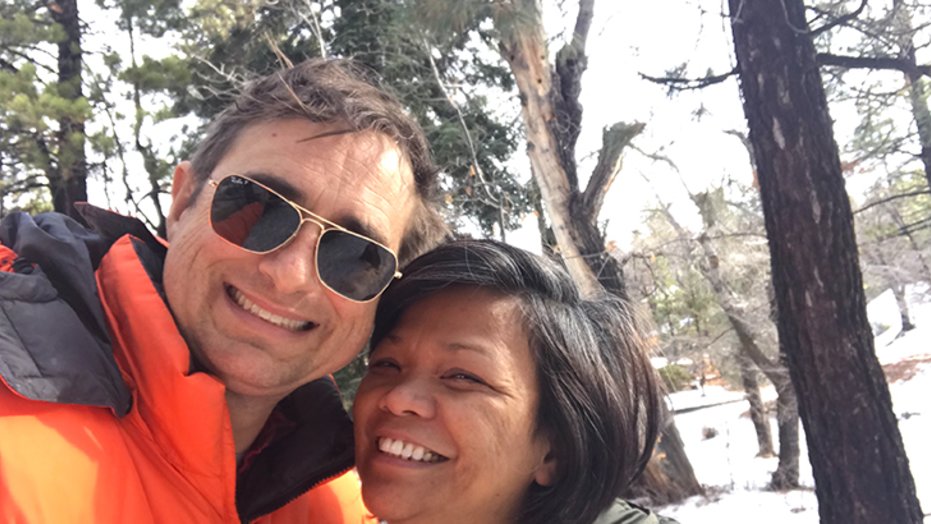
The power of early detection and innovative medicine
Karen’s non-COVID pneumonia diagnosis leads to the discovery of lung cancer and A-fib, taking her on a health journey she never expected.
Graham and Teresa Feasey are no ordinary married couple — and they don't have an ordinary story.
Graham was born in England and Teresa in the Philippines. Both immigrated to the United States decades ago, but their love story didn't begin until a fateful meeting the day Graham returned to work after a kidney transplant and open-heart surgery.
When Graham needed a second kidney transplant less than a year into their engagement, Teresa donated her kidney so Graham could have a second chance at life.
This is their story.
Graham: In 2005, I started a new job that was only a couple of miles from my home, so I decided to walk to work every day. I felt great. But over time, I noticed that I began to feel more and more tired. One day, our company gave us new office chairs, and shortly after, my legs began to swell. I thought the style of chair was cutting off my circulation, so I got another chair. Unfortunately, the problem persisted.
As time went on, I found myself short of breath just walking from one building to another at work, and then developed thrush — an infection in the mouth. Thinking that was the cause of my problems, I went to a dentist who referred me to an oral surgeon. I was prescribed anti-fungal medicine, but when the thrush didn't improve, I was referred to a doctor.
I was 33 — young and healthy, by all accounts. The first few caregivers I met with thought I was a hypochondriac, but I knew something was wrong. I got progressively worse; I could no longer hold down food, and I slept all the time.
In 2007, I climbed a flight of stairs to go to my office and was too short of breath to answer a question from a friend. I sat at my desk for 20 minutes panting. Someone insisted I go to urgent care. At urgent care, they asked me to step on the scale, but I lost my balance and fell against the wall. They took my blood pressure, and it was 208/120. I was in a hypertensive crisis. They called an ambulance and rushed me to Sharp Memorial Hospital.
At the hospital, I learned I was experiencing kidney failure.
Graham: After five years on dialysis, I received my first kidney transplant in 2011. It was a kidney from a 25-year-old woman who had passed away. I am extremely grateful that she chose to be an organ donor.
Graham: Kidney failure can cause your body to develop many other complications. While waiting for a kidney, I had a lung infection, insomnia and restless leg syndrome. After my transplant, I felt instantly better. It may sound strange, but the first time I urinated, I was elated! At this point, I had not urinated in more than four years.
Graham: After the transplant, it was discovered that I had pericarditis — an inflammation of tissue around the heart — which had been masked by all the years of dialysis. In 2012, I had open-heart surgery to relieve pressure in my heart.
It was after I healed from my heart surgery that I finally felt like I was given a new lease on life. I was full of energy, and I felt fantastic.
___
On his first day back at work from medical leave, Graham met Teresa, a colleague at work. At 6'2" and 135 pounds, Graham was frail but felt stronger and healthier than he had in years. Teresa noticed his thin frame and learned that he was back in the office after multiple surgeries. Graham and Teresa got to know each other and shortly after, began dating.
After four years together, Graham proposed to Teresa on Christmas Day 2017. Less than a year later, he would need a new kidney.

Graham and Teresa on their wedding day. Photo credit: Andriana Dyakova Photography
___
Graham: I started getting tired and nauseous again. I was having trouble holding down food and began getting migraines. My nephrologist ran tests, and it was determined I had end-stage renal failure.
Teresa: Before his kidney failed, we lived our lives as normally as any other couple. We traveled, went on hikes, mini holidays, went dancing and had an active social life. After some time, our activities began to diminish. I felt that something was wrong. Our trips to the hospital became more frequent, and at some point, we were in the hospital more than we were at our jobs.
Test after test, I was there to witness it all. It hurt to see the man I love suffer. When his nephrologist told him he needed a new kidney, preferably from a living donor, I knew I had to give one; it was a no-brainer.
The donation process was easy. What impressed me most is how passionate and dedicated the transplant team is at the hospital. Not once did I feel alone. I consider them angels on earth.
Graham: My wife is so amazing. I am grateful to her every single day. We were not a direct match, but Teresa was able to donate her kidney through the National Kidney Registry, which helps coordinate non-compatible donor-recipient pairs. Teresa's kidney went to a recipient in Boston, and mine came from a different donor/recipient couple in Boston.

Two days after surgery. Teresa and Graham had their surgeries on the same day, at Sharp Memorial Hospital.
Graham: Dr. Jeffrey Halldorson performed my second kidney transplant in December 2018. Teresa's surgery was in in the morning and mine was at night, so I was able to see her when she came out of surgery. It relieved my mind greatly to know she was all right before I went into my own surgery.
Teresa: Dr. Halldorson also performed my surgery. The Sharp nursing staff took good care of me, and Dr. Halldorson came in to see how I was doing soon after the procedure. All the transplant center staff visited me, including Graham's nephrologist, Dr. Bijal Patel.
Graham: My experience was much smoother the second time around. The kidney came to life right away, and it is working fantastic!
The post-transplant care nurses were wonderful. They kept watch over me and were attentive to my post-surgery needs.
I came home from the hospital on Dec. 24, 2018. My wife gave me the best Christmas present ever — a new kidney.
Graham: I feel great. I went back to work full time on March 25, 2019. I feel like I am operating at peak capacity. I am sleeping well, have lots of energy and I'm getting back into the swing of things.
Teresa: I started driving two weeks after my surgery. I came back to work, and I carry on as I normally do.

One month after surgery, Graham and Teresa went snow sledding in Big Bear.
Graham: My wife is amazing. She is my constant strength. She came with me to all of my nephrologist appointments and dialysis treatments. She came to all of my post-transplant clinic appointments until she returned to work. She celebrates all of my successes and helps me work through any setbacks. My friends and family provide endless support and encouragement to me.
As I share my experiences with others, I'm amazed at how many people are touched by kidney disease and kidney failure. Their cousins, parents, siblings, children and friends have been affected.
Graham: After my second transplant, we've been able to do so much. We went on a trip to Big Bear to see the snow, saw an Elton John concert and we just got back from a trip to Northern California to see the giant sequoias. It feels good to be able to get things accomplished and do things for my wife again.
Graham: Organ donation saved my life — twice! The first time, a complete stranger registered as an organ donor. Because she had the foresight to become a donor, I was able to live.
Teresa: I feel very blessed to have had the chance to save a life. The fact that it was my husband's life made it exponentially more gratifying.
To register as an organ donor, sign up with Donate Life America and select "yes" to agree to organ donation when you apply for or renew your driver's license.

The Sharp Health News Team are content authors who write and produce stories about Sharp HealthCare and its hospitals, clinics, medical groups and health plan.
Our weekly email brings you the latest health tips, recipes and stories.